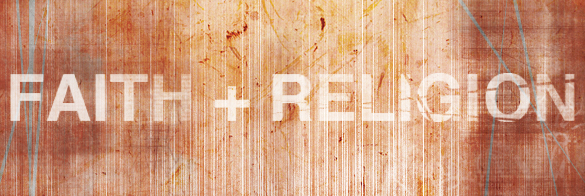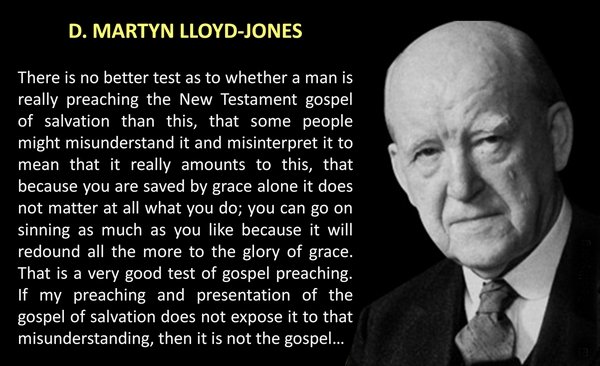A couple of years ago, I posted my most thorough expositions to date on the believer’s freedom under Grace; our freedom from legalism and others’ expectations. I wrote about others’ objections to those living under Grace, and the ‘Licence to Sin’ that some believers still go on about.
Lately, I have been in dialogue with friends who are still in fear; still wondering whether or not God is angry with them, and sadly not being able to see the all-encompassing, all-accomplishing nature of the total victory that Jesus won on the Cross.
And so, in order to bring to the fore once again the fulness of our freedom, as given us by God’s Grace, I would like to reblog those two pieces, one after the other. The first one, ‘Religion and Faith – There’s a Difference!’ I reproduce here; the second, ‘Licence to Sin’, I will post next time.
Religion and Faith – There’s a Difference!
A few days ago someone asked me the question, “Are you religious?” And without thinking, I said. “Yes” – then immediately qualified it by saying, “Well, actually, no – I’m a man of faith. There is a difference”.
Now, call me pedantic if you like. And I know what the lady meant when she asked me the question. But to me there is indeed a difference.
Religion is simply humans trying to ‘do something’ – anything! in order to be acceptable to whatever god(s) they believe in. It seems to be the default setting for that part of humanity who seek after the higher purpose, deeper meaning, the Life Essence of the universe, or even the Creator Himself – whatever they call ‘god’, they feel the need to do something. (In this piece, I am not including those who don’t seek after things like this).
So whatever it is, people try to ‘do’ stuff. This involves rituals, rules/laws, behaviour patterns, conformity to some formula told to people. This can happen with Christians, or indeed any ‘defined’ faith, or it can happen with people of no set belief system. I once found a Pagan altar in the local woods where people had performed certain ‘rituals’ and carved Runes (letters made of straight lines suitable for carving on stone or wood) on the altar. I can read Runes, and they said something like ‘we worship you earth mother’. And so, this is an example of Religion based on ‘doing’.
Faith, however, is different. Faith is described in Hebrews 11:1 as, “…confidence in what we hope for and assurance about what we do not see”. For me, this means that I have confidence in Jesus alone, and an assurance in the complete and total efficacy of His finished work on the Cross (Jn 19:30). It’s not about me, what I ‘do’, but about what He has already ‘done’. I am already acceptable to God by Jesus’s finished work on the Cross, however that works. I say that ‘however it works’ because I am still plumbing the depths of just what Jesus did there, and it’s vaster and more thorough than I think anyone realises. God’s Grace is undeserved, unlimited, extravagant, and indeed completely unfair. In Grace, we really do get something for nothing. It’s free for the taking!
This is poles apart from the constant workload of Religion!
In Christ, we can ‘rest’ in His finished work, knowing there’s nothing more to do, indeed, nothing more we can do, to make our salvation more sure.
This is a different thing from St. Paul’s statement in Colossians 1:24 where he says, “Now I rejoice in what I am suffering for you, and I fill up in my flesh what is still lacking in regard to Christ’s afflictions, for the sake of his body, which is the church.” This, I believe, refers to the works and actions that proceed naturally, flowing from the life lived in the Spirit. What part of Christ’s afflictions were incomplete? Only that the death of Christ on the Cross does not cater for the ‘practical’ things that the Spirit-led person does; the ‘works’ that are the fruit of faith. So, things like feeding the poor, clothing the naked, that sort of thing. And this is what still needs to be done. And so, this Colossians passage does not mean that for some reason Christ’s work is not ‘finished’, or that it is lacking any efficacy for our acceptance before God. It doesn’t mean that at all.
Sadly, though, even Christians, for whom Jesus said ‘It is finished!’ and for whom St. Paul says that we have freedom from these Rules, can (and usually do) have Religious rule patterns and expectations of their adherents. This is tragic; every time I’ve seen someone propound the vast freedom and benefits of Grace-based faith, there’s been someone else come on and state his ‘cautionary’ case. ‘Be careful of Grace; you don’t know what you might be getting into’. ‘Don’t let Grace be a licence to sin’, and things like that. This is all just the thin end of the wedge for legalism – going back to those Rules again. There’s always something like, ‘Ah, but we have to be careful that we don’t…’, there’s always some cautionary tale. ‘Ah, but…’ in fact has no place in Grace! The Spirit-led life means that we don’t have to worry about Law any more! So many people are sitting on riches they don’t know they have.
This is why St Paul said in Galatians 5:1, “It is for freedom that Christ has set us free. Stand firm, then, and do not let yourselves be burdened again by a yoke of slavery.” Slavery to Rules. Slavery to Religion.
I personally find that, because I have to get into the Legalism mindset in order to discuss these issues with those still trapped in legalistic systems, I find that I too begin to think in the same way as they do. In some ways, I need to do that, so that a) I can listen to what they are saying, and b) so that I can base my discussions on what Scriptures they are using. And it’s quite stifling, actually. I often feel the need to take time out and recharge my ‘Grace batteries’. Despite my freedom from Law being revealed to me personally by Father, the tendency to slide back into legalism in order to get alongside those still trapped in there is always insidious and present, because I have to think in the same way as they do in order to identify with them. It’s like trying to rescue a drowning man. Maybe I should wait until they cease struggling….
Sadly, many religious people, those dependent on their own works, however disguised or unrealised, tend to view ‘freedom from Law’ with some suspicion. Just like they did in Jesus’s day. The people who were most often on his back about His ‘behaviour’ and that of His disciples (they were feasting and partying instead of fasting like ‘proper’ religious people do) were the religious authorities. And so, people like Rob Bell, Joseph Prince, Jeff Turner, Paul Ellis; Grace preachers like these are constantly denigrated by the religious authorities of this day. Believers are always warned off from their messages of freedom, hope and joy, precisely because the religious authorities want to maintain control[1]. We can’t have believers realising their freedom, because we will lose control. Ok, so let’s ‘warn’ them about the ‘dangers’ of the ‘Grace Movement'[2] and use scare tactics like telling them that ‘Grace is a licence to sin’ and stuff like that. Actually it’s nothing of the sort; this is just used as a means of keeping people in their cages. Personally, as far as I am concerned they are wasting their time, such is the revelation of Grace I received nineteen years ago. For me, there is no going back into the cage. For others just learning the ways of Grace, my advice would be to trust the Holy Spirit within you. What He says, do (Jn 2:5). Ignore the Gatekeepers of heaven; they are actually nothing of the sort! Your freedom is yours; hold on to it!
Anyway, to sum up: Religion is always ‘do, do, do’ in order to be acceptable to God. Faith, for me, is ‘done, done, done’ and because of this I’m already acceptable to God. Wow!
“It is finished”, says the Lord!
The link to the original article is here
Footnotes
| ⇧1 | Actually, I am perhaps tarring some leaders with the same brush here – in the UK at least, most church leaders who have this kind of input into their members’ lives do so from a genuine desire to ensure that their members stay pure/clean/’sin-free’ or whatever. I understand that. But firstly, this is putting the cart before the horse; purity is more of a spiritual fruit than a spiritual task. It flows naturally from a life lived in the Spirit, and does not need to be either forced or policed. Secondly, this actually isn’t anyone’s job to do. It is not the job of Church leadership – or indeed any other person – to point out others’ ‘sins’. There are passages in the New Testament which might suggest that, and indeed St. Paul does give some ideas on how to deal with ‘badly-behaved’ church members, for the purpose of maintaining order in the church. But in our day this has been taken entirely out of context and also out of proportion; many people think that these Scriptures give them a licence to criticise and judge others. And this is simply not the case, from any of those Scriptures. Firstly, Jesus’s exhortation to ‘take the plank out of your own eye’ (Mt 7:1-5; Lk 6:41-42) is actually an exhortation to not point out others’ sin at all; secondly, the response of the person being criticised, if indeed any is required, is entirely between them and God. You might well point out someone else’s ‘sin’, but the response is up to them. You are not responsible to point out others’ ‘sins’; you are certainly not responsible for their actions or lack thereof in response to your criticism. Let’s not make any bones about it; you are actually judging and criticising others. Very rarely is it done ‘in love’!
(And how do you define ‘sin’ anyway; what is harmful for one person is not so for another) |
|---|---|
| ⇧2 | Later edit: And here I am referring not to the ‘hyperdispensationalism’ position of some Christians, but the modern move of the Holy Spirit in which God is re-emphasising salvation by Grace alone, and not ‘works’. In some places it is referred to the ‘Hyper-Grace’ movement, and is of course frowned upon by many in Evangelicalism, some of whom I have the greatest respect for. Yet another reason why I don’t like to use labels… |




